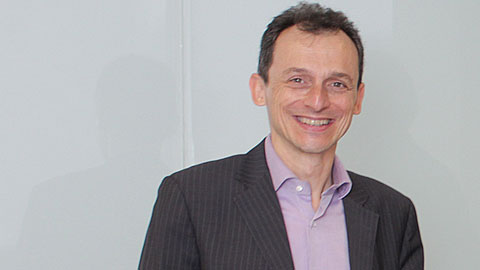"Investing in aerospace research means giving a big boost to innovation"

02/07/2015
As part of International Asteroids Day on 30 June, the Institute of Space Sciences (IEEC - CSIC) organised various activities on the UAB campus. One of these was a talk by Pedro Duque, the Spanish aeronautical engineer and European Space Agency (ESA) astronaut, held at the Eureka Building of the UAB Research Park.
Duque, the first Spaniard to have gone into space, began his space career between 1990 and 1992, when he was chosen from over 6,600 candidates to form part of the first astronaut team of the European Space Agency (ESA). Trained and prepared at NASA facilities, his opportunity came on 29 October 1998 when he first flew into space aboard the space shuttle “Discovery”. Five years later he returned to space aboard the Russian space shuttle Soyuz and travelled to the International Space Station. In October 2006, he took a sabbatical from the ESA and was CEO of the company Deimos Imaging SL, which launched the first Spanish Earth observation satellite.
Since 2011, Duque has combined the management of the Office of Flight Operations of the European Space Agency with his work as lecturer in aeronautical engineering.
Why should we care about asteroids?
Every year hundreds of rocks collide with the Earth's atmosphere, but most of these disintegrate before reaching its surface. Though the chances are low, Earth can also receive impacts from larger asteroids, which could be the cause of huge devastation. For example, on 15 February 2013 an asteroid of around 20 metres in size fell on the town of Chelyabinsk in Russia, undetected by space monitoring programmes.
We are keeping tabs on about 700,000 asteroids, but there are calculated to be about 1.000 million roaming space. So we only know about a tiny fraction of them all. For this reason, it is very important to invest in asteroid research in order to understand the mechanisms that cause them to collide with Earth and the size of the potential impact, and to explore the technological feasibility of mining their mineral resources.
What does your current job at the European Space Agency involve?
I came back to the European Space Agency as an astronaut three years ago and I am still qualified to go on another space voyage if the chance arises. I also evaluate astronauts' ideas and projects for possible future developments, and new experiments on board the International Space Station, to make sure they are feasible and would produce results.
What is the potential of aerospace technologies for industry?
In general carrying out aerospace projects requires new materials and new processes, as we can't achieve our objectives using existing technology. So these projects give a great boost to innovation. In particular they boost miniaturisation, since every gramme and every centimetre count in space. Products that in any other industry would not need to be miniaturised have to be made a hundred times smaller to be used in space. For example, computers were made smaller so they could fit in the Saturn V rocket, used in 1967 in the Apollo programme.
Then these innovations from aerospace projects come back to industry to be used in other sectors.
What incentives do you think could be given for space technologies to be used in other areas?
Mainly, I think it is essential to keep the general public informed on everything that is being done to explore space. In addition, more sectors of industry need to be brought into space projects so that in future they will apply the new technologies they have helped to develop in other contexts.
Why is it important to invest in space?
Because it creates products and services that society needs. We have to invest in space to improve our communications satellites, for example, or to study the Earth's climate, compiling data that will help to increase awareness of how much it is changing.
And also, because we can do science in space that we can't do on Earth, like using telescopes to make observations that are impossible from down here, or conducting experiments that are beyond the scope of any laboratory on Earth.
Most importantly of all, aerospace projects give a great boost to innovation and new developments. With a small contribution from governments to these projects, society could benefit from the solutions they develop, the patents generated, and the knowledge of the professionals involved.
What great advances can we expect to see in space exploration in the decades to come?
Above all, the discovery of new planets outside our solar system. This means we can search for planets that are similar to Earth and determine whether multi-planetary systems around one star, like our own, are common.
I also believe that in the near future space tourism will become popular.